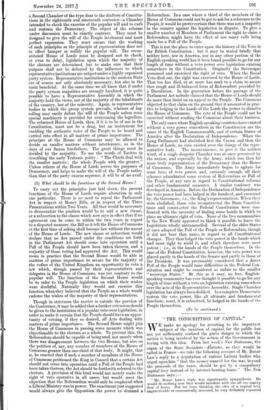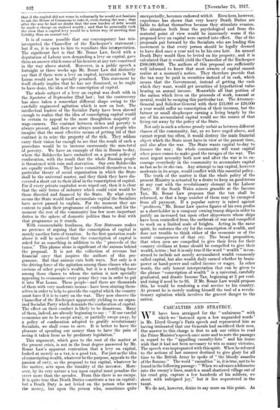" THE CONSCRIPTION OF CAPITAL."
WE make no apology for reverting to the important subject of the taxation of capital, for the public has not yet sufficiently realized the grave danger in which the nation is being involved by the action of the Government in toying with this idea. From last week's New Stales:non, the organ of the State Socialists—gatistes, as they would be called in France—we take the following account of Mr. Boner Law's reply to a deputation of various Labour bodies who urged upon him " that the money wanted for the war, beyond the proceeds of the taxes, should be got by a compulsory capital levy instead of by interest-bearing loans." The New Statesman says:— " Mr. Boner Law's reply wan significantly sympathetic. He would do nothing now that would interfere with the all too scanty flow of loam. But far from thinking the idea of a capital levy impracticable or economically unsound, he very definitely repeated
that if the capital did not come in voluntarily he would not hesitate to ask the House of Commons to take it, even during the war ; that after the war he had no doubt that the new burden of debt would be made a charge on realised wealth ; and that he personally took the view that a capital levy would be a better way of meeting that liability than an annual tax."
It is of course possible that our contemporary has mis- interpreted the Chancellor of the Exchequer's statement ; but if so, it is open to him to repudiate this interpretation. The significant fact is that Mr. Boner Law, faced with a deputation of Labour men demanding a levy on capital, gave them an answer which some of his hearers at any rate construed in the way above stated. Moreover, in a public speech a fortnight or three weeks ago Mr. Boner Law did distinctly say that if there were a levy on capital, investments in War Loans would not be specially penalized. This statement by itself clearly implies that he has not dismissed, as he ought to have done, the idea of the conscription of capital.
The whole subject of a levy on capital was dealt with in the Spectator of September 22nd last ; but the controversy has since taken a somewhat different shape owing to the carefully engineered agitation which is now on foot. The . intellectual leaders of the Socialist Party have been shrewd enough to realize that the idea of conscripting capital would be certain to appeal to the more thoughtless majority of wage-earners. The contrast between riches and poverty is always present, and there are always numbers of people who imagine that the most effective means of getting rid of that contrast is to seize the property of the rich. They seldom carry their vision far enough to see that the result of such a , procedure would be to increase enormously the sum-total of poverty. We have an example of this in Russia to-day, where the Bolsheviks have embarked on a general policy of confiscation, with the result that the whole Russian people is threatened with ruin and starvation. Our own Bolsheviks are equally reckless. They have committed themselves to a , particular theory of social organization in which the State j shall be the universal master, and they think they have dis- covered a short cut to their ideal in the conscription of capital. For if every private capitalist were wiped out, then it is clear that the only forms of industry which could exist would be those directed and financed by the State. By what exact means the State would itself accumulate capital the Socialists , have never paused to explain. For the moment they are content to push their programme of confiscation, and for the moment the rest of the community has few more important duties in the sphere of domestic politico than to deal with that programme as it stands.
With commendable frankness, the New Statesman makes no pretence of arguing that the conscription of capital is merely another form of taxation. In the first quotation made above it will be noticed that the conscription of capital is asked for as something in addition to the " proceeds of the taxes." This phrase alone is significant of the animus behind the proposal. It is not the collection of revenue but financial envy that inspires the authors of this pro- gramme. But that animus cuts both ways. Not only is it the driving-force of the agitation among those classes who are envious of other people's wealth, but it is a terrifying force among those classes to whom the nation is now specially appealing to economize every penny they can in order to put it into War Loans. These people—and there are thousands of them with very moderate means—have been stinting them- selves in order to help to provide the capital which the country must have if it is to carry on the war. They now observe the Chancellor of the Exchequer apparently yielding to an organ- ized Socialist Party which demands the confiscation of capital. The effect on their conduct is likely to be disastrous. Many of them, indeed, are already beginning to say : " If our careful economies are to be swept away, or partially swept away, by a policy of confiscation adopted to gratify revolutionary Socialists, we shall cease to save. It is better to have the pleasure of spending our money than to have the pain of seeing it taken from us by predatory legislation."
This argument, which goes to the root of the matter at the present crisis, is not in the least degree answered by Mr. Boner Law's apparent contention that a levy on capital, looked at merely as a tax, is a good tax. For just aa the idea of conscripting wealth, whatever be the purpose, appeals to the passion of envy, so the proposal to tax capital, whatever be the motive, acts upon the timidity of the investor. More- over, by its very nature a tax upon capital must penalize the saver more than the spender. From this there is no escape. It is quite true that Death Duties constitute a tax on capital ; but a Death Duty is not levied on the person who saves the money, but upon the person who, sometimes quite unexpectedly, becomes endowed with it. Even here, however, experience has shown that very heavy Death Duties are liable to defeat themselves because they stimulate evasion. The situation both from the psychological and from the material point of view would be immensely worse if the proposed levy on capital were carried into effect. One of the proposals put forward by the Socialists who are leading this movement is that every person should be legally deemed to have died once a year and to be his own heir. An annual Death Duty would then be levied on his property, and it is calculated that it would yield the Chancellor of the Exchequer £900,000,000. The authors of this proposal are sufficiently well informed to know that most owners of capital cannot realize at a moment's notice. They therefore provide that the tax may be paid in securities instead of in cash, which means that the Government, instead of getting the cash which they want, would get securities of hypothetical value bearing an annual income. Meanwhile all that portion of the nation which lives on the proceeds of work, manual or mental, would be escaping this particular tax. The Attorney- General and Solicitor-General with their £15,000 or £20,000 a year would suffer no conscription of their incomes, but the farmer or small shopkeeper earning a living largely by the use of his accumulated capital would see the source of that living cut away by the policy of the State.
Not only is such a scheme grossly unfair as between different classes of the community, but, as we have urged above, and cannot repeat too often, it would destroy the main financial object which the State must have in view at the present time, and also after the war. The State wants capital to-day to finance the war ; the whole community will want capital when peace comes to make good the ravages of the war. The most urgent necessity both now and after the war is to en- courage everybody in the community to accumulate capital as fast as he or she can. Any attempt to tax capital, however moderate in its scope, would conflict with this essential policy. The truth of the matter is that the whole policy of the present Ministry is actuated by a desire to keep on good terms at any cost with the revolutionary element in the Labour Party. If the South Wales miners grumble at the Income Tax, Mr. Boner Law proposes that the tax shall be reformed, so that a large number of them may be exempted front all payment. If a popular outcry is raised against "profiteers," Mr. Boner Law quotes figures of his own profits as a shareholder in a company owning tramp ships in order to justify an increased tax upon other shipowners whose ships have been controlled from the outbreak of war and compelled to work on a limited scale of freights. Acting in the same spirit, he endorsesther for conscriptionof wealth, and
ioesnottroubletotaketteroieconomicorote
moral consequences of that cry. The broad proposition, that when men are compelled to give their lives for their country civilians at home should be compelled to give their wealth, is true ; but it is only true if the word " wealth " is con- strued to include not merely accumulated wealth commonly called capital, but also wealth daily earned whether by brain- power or hand-power and called income or wages. In other words, the only honest interpretation that can be given to the phrase "conscription of wealth" is a universal, carefully graduated, and drastic Income Tax, beginning at 5 per cent. and rising if need be to 95. If Mr. Boner Law would propose this, he would be rendering a real service to his country. At present he is merely making himself the tool of a revolu- tionary agitation which involves the gravest danger to the nation.







































 Previous page
Previous page